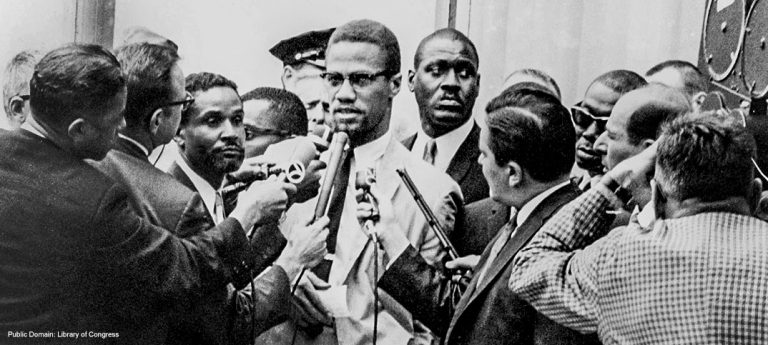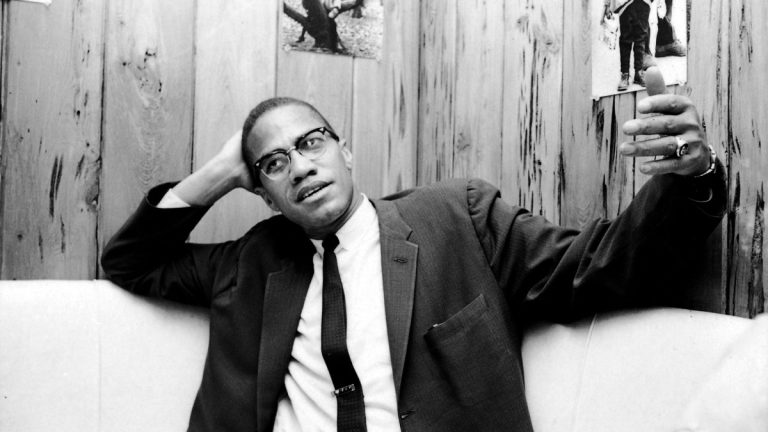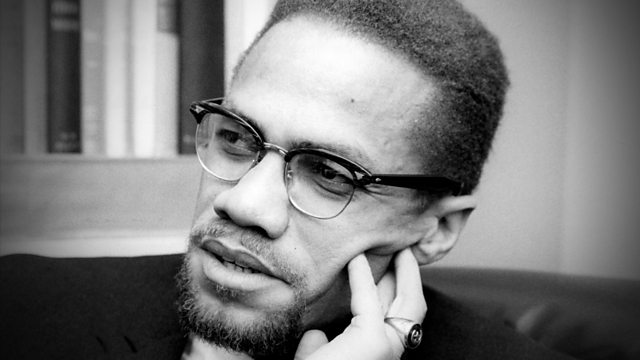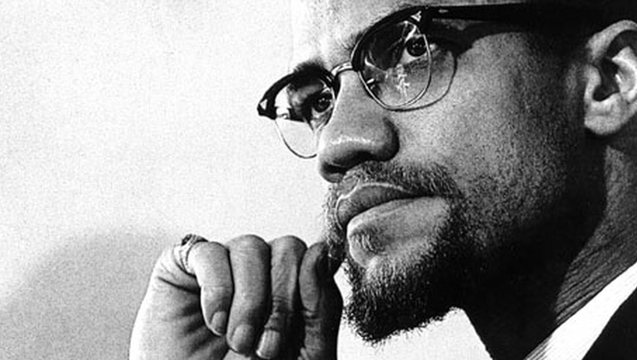MALCOLM X: Prospects for Freedom in 1965 (January 7, 1965)

Mr. Chairman, who’s one of my brothers, ladies and gentlemen, brothers and sisters: It is an honor to me to come back to the Militant Labor Forum again this evening. It’s my third time here. I was just telling my brother up here that probably tomorrow morning the press will try to make it appear that this little chat that we’re having here this evening took place in Peking or someplace else. They have a tendency to discolor things in that way, to try and make people not place the proper importance upon what they hear, especially when they’re hearing it from persons they can’t control, or, as my brother just pointed out, persons whom they consider “irresponsible.”
Download the first chapter of The Storytelling Series: Beginners’ Guide for Small Businesses & Content Creators by Obehi Ewanfoh.
It’s the third time that I’ve had the opportunity to be a guest of the Militant Labor Forum. I always feel that it is an honor and every time that they open the door for me to do so, I will be right here. The Militant newspaper is one of the best in New York City. In fact, it is one of the best anywhere you go today because everywhere I go I see it. I saw it even in Paris about a month ago; they were reading it over there. And I saw it in some parts of Africa where I was during the summer. I don’t know how it gets there. But if you put the right things in it, what you put in it will see that it gets around.
Tonight, during the few moments that we have, we’re going to have a little chat, like brothers and sisters and friends, and probably enemies too, about the prospects for peace—or the prospects for freedom in 1965. As you notice, I almost slipped and said peace. Actually you can’t separate peace from freedom because no one can be at peace unless he has his freedom. You can’t separate the two—and this is the thing that makes 1965 so explosive and so dangerous.
The people in this country who in the past have been at peace and have been peaceful were that way only because they didn’t know what freedom was. They let somebody else define it for them, but today, 1965, you find those who have not had freedom, and were not in a position to define freedom, are beginning to define it for themselves. And as they get in a position intellectually to define freedom for themselves, they see that they don’t have it, and it makes them less peaceful, or less inclined towards peace.
You might also like to read – MALCOLM X: Prospects for Freedom in 1965 (January 7, 1965)
In 1964, oppressed people all over the world, in Africa, in Asia and Latin America, in the Caribbean, made some progress. Northern Rhodesia threw off the yoke of colonialism and became Zambia, and was accepted into the United Nations, the society of independent governments. Nyasaland became Malawi and also was accepted into the UN, into the family of independent governments. Zanzibar had a revolution, threw out the colonialists and their lackeys and then united with Tanganyika into what is now known as the Republic of Tanzania—which is progress, indeed.
Also in 1964, the oppressed people of South Vietnam, and in that entire Southeast Asia area, were successful in fighting off the agents of imperialism. All the king’s horses and all the king’s men haven’t enabled them to put North and South Vietnam together again. Little rice farmers, peasants, with a rifle—up against all the highly-mechanized weapons of warfare—jets, napalm, battleships, everything else, and they can’t put those rice farmers back where they want them. Somebody’s waking up.
In the Congo, the People’s Republic of the Congo, headquartered at Stanleyville, fought a war for freedom against Tshombe, who is an agent for Western imperialism—and by Western imperialism I mean that which is headquartered in the United States, in the State Department.
In 1964 this government, subsidizing Tshombe, the murderer of Lumumba, and Tshombe’s mercenaries, hired killers from South Africa, along with the former colonial power, Belgium, dropped paratroopers on the people of the Congo, used Cubans, that they had trained, to drop bombs on the people of the Congo with American-made planes—to no avail. The struggle is still going on, and America’s man, Tshombe, is still losing.
All of this in 1964. Now, in speaking like this, it doesn’t mean that I am anti-American. I am not. I’m not anti-American, or un-American. And I’m not saying that to defend myself. Because if I was that, I’d have a right to be that — after what America has done to us. This government should feel lucky that our people aren’t anti-American. They should get down on their hands and knees every morning and thank God that 22 million black people have not become anti-American. You’ve given us every right to. The whole world would side with us, if we became anti-American. You know, that’s something to think about.
But we are not anti-American. We are anti or against what America is doing wrong in other parts of the world as well as here. And what she did in the Congo in 1964 is wrong. It’s criminal, criminal. And what she did to the American public, to get the American public to go along with it, is criminal. What she’s doing in South Vietnam is criminal. She’s causing American soldiers to be murdered every day, killed every day, die every day, for no reason at all. That’s wrong. Now, you’re not supposed to be so blind with patriotism that you can’t face reality. Wrong is wrong, no matter who does it or who says it.
Also in 1964, China exploded her bomb, which was a scientific breakthrough for the oppressed people in China, who suffered for a long time. I, for one, was very happy to hear that the great people of China were able to display their scientific advancement, their advanced knowledge of science, to the point where a country which is as backward as this country keeps saying China is, and so behind everybody, and so poor, could come up with an atomic bomb. Why, I had to marvel at that. It made me realize that poor people can do it as well as rich people.
So all these little advances were made by oppressed people in other parts of the world during 1964. These were tangible gains, and the reason that they were able to make these gains was they realized that power was the magic word—power against power. Power in defense of freedom is greater than power in behalf of tyranny and oppression, because power, real power, comes from conviction which produces action, uncompromising action. It also produces insurrection against oppression. This is the only way you end oppression—with power.
Power never takes a back step—only in the face of more power. Power doesn’t back up in the face of a smile, or in the face of a threat, or in the face of some kind of nonviolent loving action. It’s not the nature of power to back up in the face of anything but some more power. And this is what the people have realized in Southeast Asia, in the Congo, in Cuba, in other parts of the world. Power recognizes only power, and all of them who realize this have made gains.
Now here in America it’s different. When you compare our strides in 1964 with strides that have been made forward by people elsewhere all over the world, only then can you appreciate the great doublecross experienced by black people here in America in 1964. The power structure started out the new year the same way they started it out in Washington the other day. Only now they call it—what’s that?—”The Great Society?” Last year, 1964, was supposed to be the “Year of Promise.” They opened up the new year in Washington, D.C., and in the city hall and in Albany talking about the Year of Promise.
But by the end of 1964, we had to agree that instead of the Year of Promise, instead of those promises materializing, they substituted devices to create the illusion of progress; 1964 was the Year of Illusion and Delusion. We received nothing but a promise. In 1963, one of their devices to let off the steam of frustration was the march on Washington. They used that to make us think we were making progress. Imagine, marching to Washington and getting nothing for it whatsoever.
In ’63, it was the march on Washington. In ’64, what was it? The civil-rights bill. Right after they passed the civil-rights bill, they murdered a Negro in Georgia and did nothing about it; murdered two whites and a Negro in Mississippi and did nothing about it. So that the civil-rights bill has produced nothing where we’re concerned. It was only a valve, a vent, that was designed to enable us to let off our frustrations. But the bill itself was not designed to solve our problems.
Since we see what they did in 1963, and we saw what they did in 1964, what will they do now, in 1965? If the march on Washington was supposed to lessen the explosion, and the civil-rights bill was designed to lessen the explosion—that’s all it was designed to do; it wasn’t designed to solve the problems; it was designed to lessen the explosion. Everyone in his right mind knows there should have been an explosion. You can’t have all those ingredients, those explosive ingredients that exist in Harlem and elsewhere where our people suffer, and not have an explosion. So these are devices to lessen the danger of the explosion, but not designed to remove the material that’s going to explode.
What will they give us in 1965? I just read where they planned to make a black cabinet member. Yes, they have a new gimmick every year. They’re going to take one of their boys, black boys, and put him in the cabinet, so he can walk around Washington with a cigar—fire on one end and fool on the other.
And because his immediate personal problem will have been solved, he will be the one to tell our people, “Look how much progress we’re making: I’m in Washington, D.C. I can have tea in the White House. I’m your spokesman, I’m your, you know, your leader.” But will it work? Can that one, whom they are going to put down there, step into the fire and put it out when the flames begin to leap up? When people take to the streets in their explosive mood, will that one, that they’re going to put in the cabinet, be able to go among those people? Why, they’ll burn him faster than they burn the ones who sent him.
At the international level in 1964, they used the device of sending well-chosen black representatives to the African continent, whose mission it was to make the people on that continent think all our problems had been solved. They went over there as apologists. I saw some of them, trailed some of them and saw the results that some of them had left there. Their prime mission was to go into Africa, which is most vital to the United States’ interests. These Toms—you’re not supposed to call them Toms nowadays; they’ll sue you—so these Uncles were sent over there…don’t bother the man. He’s doing his job. He’s going to put you on TV, so you can get investigated. These Toms don’t go to Africa because they want to explore, learn something for themselves, broaden their scope, or communicate between their people and our people over there. They go primarily to represent the United States government. And when they go, they gloss things over, they tell how well we are doing here, how the civil-rights bill has settled everything, and how the Nobel Peace Prize was handed down. Oh, yes, that’s how they tell it. Actually they succeed in widening the gap between Afro-Americans and the Africans. The image that they leave there of the Afro-American is so obnoxious that the African ends up not wanting to identify with us or be related to us.
It is only when the nationalist-minded or black-minded Afro-American goes abroad to the African continent and establishes direct lines of communication and lets the African brothers know what is happening over here, and know that our people are not so dumb that we are blind to our true condition and position in this structure, that the Africans begin to understand us and identify with us and sympathize with our problems, to the point where they are willing to make whatever sacrifices are necessary to see that their long-lost brothers get a better break than we have been getting up to now.
On the national scale during 1964, as I just mentioned, politically, the Mississippi Freedom Democratic Party had its face slapped at Atlantic City, at a convention over which Lyndon B. Johnson was the boss, and Hubert Humphrey was the next boss, and Mayor Wagner had a lot of influence himself. Still none of that influence was shown in any way whatsoever when the hopes and aspirations of the people, the black people of Mississippi, were at stake.
Though at the beginning of ’64 we were told that our political rights would be broadened, it was in 1964 that the two white civil-rights workers, working with the black civil-rights worker, were murdered. They were trying to show our people in Mississippi how to become registered voters. This was their crime. This was the reason for which they were murdered.
And the most pitiful part about them being murdered was the civil-rights organizations themselves being so chicken when it comes to reacting in the way that they should have reacted to the murder of these three civil-rights workers. The civil-rights groups sold those three brothers out—sold them out—sold them right down the river. Because they died and what has been done about it? And what voice is being raised every day today in regards to the murder of those three civil-rights workers?
So this is why I say if we get involved in the civil-rights movement and go to Mississippi, or anyplace else, to help our people get registered to vote, we intend to go prepared. We don’t intend to break the law, but when you’re trying to register to vote you’re upholding the law. It’s the one who tries to prevent you from registering to vote who’s breaking the law, and you’ve got a right to protect yourself by any means necessary. And if the government doesn’t want civil-rights groups going equipped, the government should do its job.
Concerning the Harlem incident that took place during the summer when the citizens of Harlem were attacked in a pogrom. I can’t pronounce it, because it’s not my word. We had heard long before it took place that it was going to take place. We had gotten the word that there were elements in the power structure that were going to incite something in Harlem that they could call a riot—in order that they could step in and be justified in using whatever measures necessary to crush the militant groups which were still considered in the embryonic stage.
And realizing that there was a plan afoot to instigate something in Harlem, so they could step in and crush it, there were elements in Harlem, who were prepared and qualified and equipped to retaliate in situations like that, who purposely did not get involved. And the real miracle of the Harlem explosion was the restraint exercised by the people of Harlem. The miracle of 1964, I’ll tell it to you straight, the miracle of 1964, during the incidents that took place in Harlem, was the restraint exercised by the people in Harlem who are qualified and equipped, and whatever else there is, to protect themselves when they are being illegally and immorally and unjustly attacked.
An illegal attack, an unjust attack and an immoral attack can be made against you by anyone. Just because a person has on a uniform does not give him the right to come and shoot up your neighborhood. No, this is not right, and my suggestion would be that as long as the police department doesn’t use those methods in white neighborhoods, they shouldn’t come to Harlem and use them in our neighborhood.
I wasn’t here. I’m glad I wasn’t here. Because I’d be dead, they’d have to kill me. I’d rather be dead than let someone walk around my house or in my neighborhood shooting it up, where my children are in the line of fire. Either they’d die or I’d die.
It’s not intelligent—and it all started when a little boy was shot by a policeman, and he was turned loose the same as the sheriff was turned loose in Mississippi when he killed the three civil-rights workers.
I’m almost finished. I’m taking my time tonight because I’m overworked. I’m taking my time by not hurrying up, I mean. In 1964 we had still with us the slumlords, people who own the houses but don’t live there themselves; usually they live up around the Grand Concourse or somewhere. They contribute to the NAACP and CORE and all the civil-rights organizations; give you money to go out and picket, and they own the house that you’re picketing.
You might also like to read – MALCOLM X: Prospects for Freedom in 1965 (January 7, 1965)
These bad housing conditions that continue to exist up there keep our people victims of health problems—high infant and adult mortality rates, higher in Harlem than any other part of the city. They promised us jobs and gave us welfare checks instead; we’re still jobless, still unemployed; the welfare is taking care of us, making us beggars, robbing us of our dignity, of our manhood.
So I point out that 1964 was not a pie-in-the-sky Year of Promise, as was promised in January of that year. Blood did flow in the streets of Harlem, Philadelphia, Rochester, some places over in New Jersey and elsewhere. In 1965 even more blood will flow. More than you ever dreamed. It’ll flow downtown as well as uptown. Why? Why will it flow? Have the causes that forced it to flow in ’64 been removed? Have the causes that made it flow in ’63 been removed? The causes are still there.
In 1964, 97 per cent of the black American voters supported Lyndon B. Johnson, Hubert Humphrey and the Democratic Party. Ninety-seven per cent! No one minority group in the history of the world has ever given so much of its uncompromising support to one candidate and one party. No one people, no one group, has ever gone all the way to support a party and its candidate as did the black people in America in 1964.
And the first act of the Democratic Party, Lyndon B. included, in 1965, when the representatives from the state of Mississippi who refused to support Johnson came to Washington, D.C., and the black people of Mississippi sent representatives there to challenge the legality of these people being seated, what did Johnson say? Nothing! What did Humphrey say? Nothing! What did Robert Pretty-Boy Kennedy say? Nothing! Nothing! Not one thing! These are the people that black people have supported. This is the party that they have supported. Where were they when the black man needed them a couple days ago in Washington, D.C.? They were where they always are—twiddling their thumbs someplace in the poolroom, or in the gallery.
Black people in 1965 will not be controlled by these Uncle Tom leaders, believe me; they won’t be held in check, they won’t be held on the plantation by these overseers, they won’t be held on the corral, they won’t be held back at all.
The frustration of these black representatives from Mississippi, when they arrived in Washington, D.C., the other day, thinking, you know, that the Great Society was going to include them—only to see the door closed in their face like that—that’s what makes them think. That’s what makes them realize what they’re up against. It is this type of frustration that produced the Mau Mau. They reached the point where they saw that it takes power to talk to power. It takes power to make power respect you. It takes madness almost to deal with a power structure that’s so corrupt, so corrupt.
So in 1965 we should see a lot of action. Since the old methods haven’t worked, they’ll be forced to try new methods.
Learn how to master your storytelling skills so you can build your influence. Download the first chapter of The Storytelling Series: Beginners’ Guide for Small Businesses & Content Creators by Obehi Ewanfoh.





